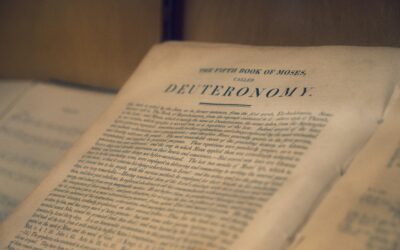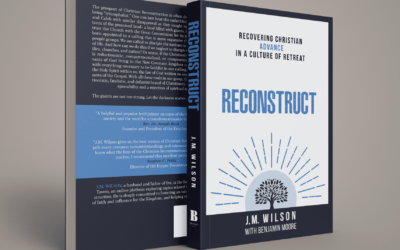The following is an excerpt from Chapter 9 of J.M. Wilson’s book, “Reconstruct“. This chapter addresses 13 common objections to theonomy and Christian reconstruction. The following paragraphs address the charge that theonomy is allegedly a recent theological “innovation” of the past century, untethered to any historical Christian tradition.
With the emergence of theologians like R. J. Rushdoony, Gary North, and Greg Bahnsen, it is true that theonomic principles and ethics have found a renewed emphasis in contemporary times. While the actual term “theonomy” came to prominence in the last seventy years or so, the underlying principles to which this term refers are ancient among Christian societies. Modern day critics of theonomy who are seeking to dismiss it often define it in such a fashion as to regard it as a complete unknown in the history of Christendom. Typically, they will define it as a system of government whereby a nation uses the Old Testament books of Scripture in their entirety to regulate all affairs. This of course has never been what theonomy has entailed.
As stated in Chapter 6, the definitional distinctiveness of “theonomy” is found in the affirmation that civil magistrates today are obligated to rule in accordance with God’s law, including some (but not all) civil laws given under Moses. Old Testament laws which were particularly applicable to Israel either culturally (think roof railing laws) or redemptively (think ceremonial laws) would not be present in a theonomic civil government today. With this in mind, “theonomy,” when properly defined, is indeed historically tethered to the tradition and practice of Christian civil governance.
As mentioned in Chapter 6, it is no surprise that during the days of the early church, questions about how Christian civil magistrates should govern were not top of mind. First of all, following the Assyrian exile of 722 BC and the Babylonian exile of Israel in 586 BC, comprehensive biblical civil law had only been sporadically attempted in periods like the Hasmonean Dynasty (140–37 BC) following the Maccabean revolt. During the first century AD, Christianity was in its infancy and was experiencing significant persecution. In those days, broadly speaking, Christians were marginalized and did not often occupy seats of civil authority.
Given these conditions, we have no comprehensive New Testament treatise on Christian civil government (as can be expected since the judicial laws were already written, and Christians weren’t in the seats of civil power). That being said, as Christianity grew in number and influence, the matter of how Christian civil government should be administered became unavoidable.
From Emperor Constantine of the Roman Empire and Emperor Justinian of the Byzantine Empire, to Alfred the Great and the Anglo-Saxon Kingdoms, to Charlemagne of the Frankish Kingdoms, to European governments throughout the Reformation period, many different flavors of theocratic civil government emerged from the cauldron of burgeoning Christendom. There were also the various Gothic Kingdoms, the ancient Christian society in Armenia, the ancient African Christian societies of Alexandria, Carthage, Ethiopia, and more.
Many were Christian theocracies but largely ignored or even defied Mosaic case laws and so were not examples of “theonomy.” The key to point out is that while there were certainly significant departures from biblical civil law orders, there were also instances of great conformity to it.
Emperors like Constantine and Justinian maintained forms of Christian theocracy and ethics, but kept much of the pagan legal framework of the ancient Greco-Roman tradition (the Justinian Code) and largely ignored any appeal to transcendent biblical Mosaic law. By contrast, Alfred the Great (King of the Anglo-Saxons, lived 849–901 AD) who delivered his people from Viking conquest, ensured that his “Law Code” explicitly appealed to the abiding validity of Mosaic law.
He begins by laying out the Ten Commandments and from there outlines the case laws of Moses in the book of Exodus. He affirms that Christ Himself did not abolish them. Like theonomists today, he also did not seek to apply them in a manner that ignored what was particular to Old Covenant Israel, but applied the general equity of the Mosaic Law and applied it to his own context.
While not every interpretation or application of Mosaic law by King Alfred may be shared by theonomists today, they nevertheless share the same approach to the civil magistrate and the Old Testament law, that is, the civil magistrate must adhere to it. This is the fundamental component of theonomy.
In the sixteenth and seventeenth centuries, the Reformers and their successors also possessed a mix of views related to the abiding validity of the judicial laws given to Moses. While not unanimous, the crux of the theonomic approach was well within the stream of reformational thought in this regard. Regarding the abiding validity of the Mosaic civil laws, sixteenth century German theologian Johannes Piscator states:
“The magistrate is obliged to those judicial laws which teach concerning matters which are immutable and universally applicable to all nations, but not to those which teach concerning matters which are mutable and peculiar to the Jewish or Israelite nations for the times when those governments remained in existence.”
In other words, the Mosaic laws still apply insofar as they were not particular to Israel. This is exactly what theonomy teaches.
Baptist theologian and scholar John Gill also affirmed the abiding validity of the judicials that were not particular to Israel:
“It may be inquired, whether the judicial laws, or the laws respecting the Jewish polity, are now in force or not, and to be observed or not; which may be resolved by distinguishing between them; there were some that were peculiar to the state of the Jews… The laws that continued to obligate civil magistrates were judicial laws, which were founded on the light of nature, on reason, and on justice and equity, and these remain in full force; and they must be wise as well as righteous laws, which were made by God himself, their King and Legislator… And they are, certainly, the best constituted and regulated governments that come nearest to the commonwealth of Israel…”
These are but a couple of examples and other instances could be multiplied in the works of other Reformers as well as various Puritans from John Knox and Pierre Viret to George Gillespie and John Cotton.
It is worth noting that even if it were true that theonomy has not been practiced in the history of Christendom thus far, it still would not refute theonomy. Biblical commands are still biblical commands regardless of if they have been obeyed in history (whether completely, partially, or not at all). To be sure, during the first five centuries of Christendom, much of the focus was on purging heresies related to Christology and other core doctrines of the faith. Much of what followed since then up to the Protestant Reformation has been focused on ecclesiastical clashes and the doctrine of the church and its authority.
Some say that the issue of proper biblical civil governance is simply an area that has been left mostly unsanctified by Christians throughout history, and that now is the time for civil reformation. Regardless of these speculations, the Word of God remains true, and the folly of governments doing what seems right in their own eyes is clear. The laws God has laid forth for civil magistrates in scripture are ignored to their own peril, and to the peril of those they govern.
Footnotes
-
F. N. Lee, King Alfred the Great and Our Common Law (Brisbane, Australia: Department of Church History, Queensland Presbyterian Theological Seminary, 2000).
-
Johannes Piscator, Disputations on the Judicial Laws of Moses, trans. Adam Jonathan Brink (Braselton, GA: American Vision, 2015), 4–5.
-
John Gill, “Of the Law of God,” in A Body of Doctrinal Divinity.





0 Comments